Election Watch Mid-Week Extra: “Sit Down” Interview
Kamala Harris & Tim Walz are “sitting down” tomorrow for an interview with CNN’s Dana Bash. They are smart to mix it up by doing it together. Maybe we’ll get an actual conversation. We’ll see.
Right before the DNC I read a story that described the “elephant in the arena” as “the memory of what happened to another female Democratic nominee who seemingly had the measure of Trump.”
As it turned out, however, the “poignant lessons” of “what happened” turned out to be exactly as they were diagnosed when, shortly after the 2016 election, pundits and journalists began their post-mortems. Now as then, the “agonizing experience of her loss” was blamed, explicitly or implicitly, entirely on Clinton:
“Lesson one of the 2016 rulebook: avoid hubris.”
Lesson two: “Being the first female president is no longer enough – it’s what you would do with it.”
Lesson three: “Democratic presidential candidates ignore the Rust belt states – and especially the ‘blue wall’ states of Pennsylvania, Michigan and Wisconsin – at their peril.”
“Biggest takeaway of all: “Don’t assume that the good times will last forever.”
We already know that Kamala Harris is taking lesson three very seriously. Lesson two is as much the fault of Trump, Sanders, and those who blasted the hugely qualified Hillary as running on her gender. The others? They are not so much “lessons” for Kamala as criticisms of Hillary for what the press continually presented to us as her arrogance. Among the evidence of “hubris” that irritated them the most? The fact that she wouldn’t set herself up for their interrogation in interviews and press conferences.

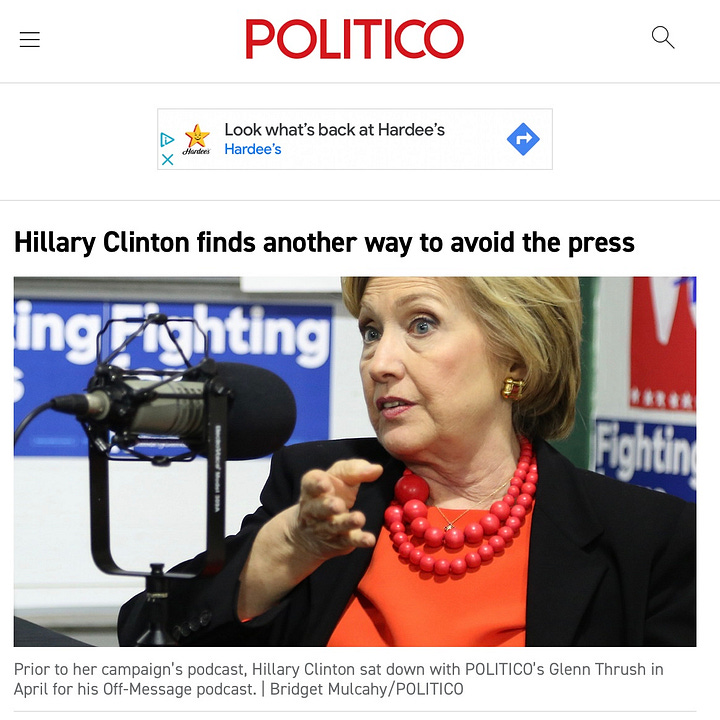
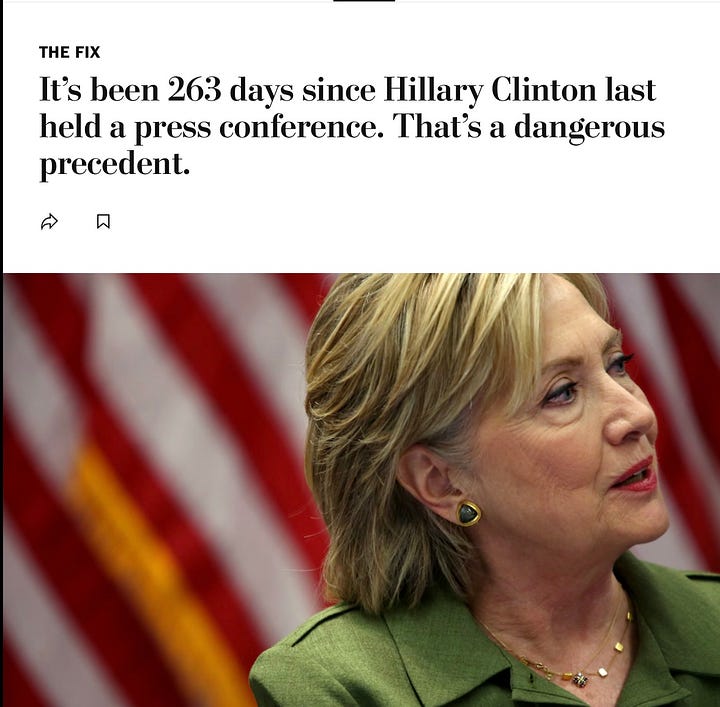
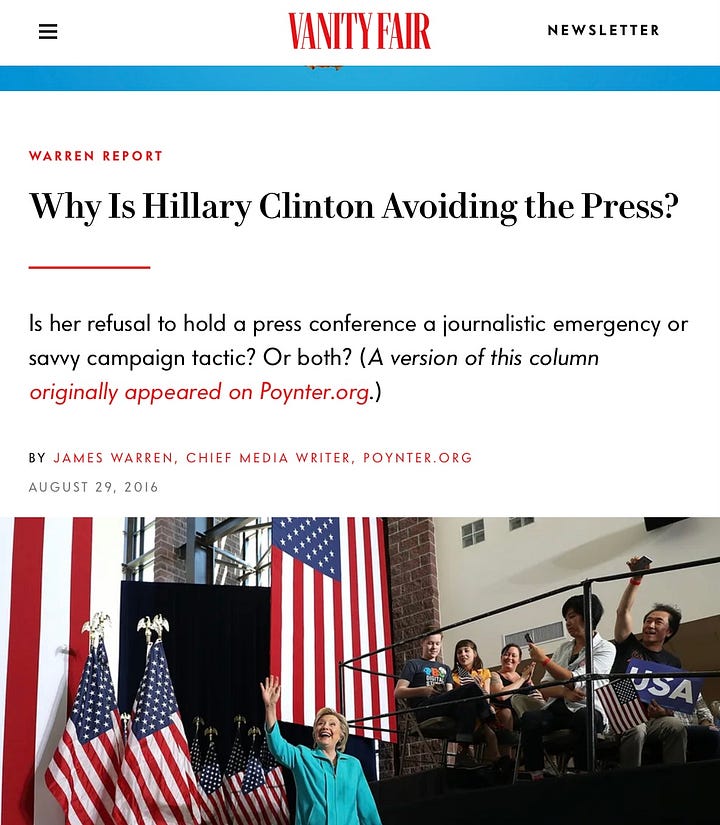
Surprise! Now that the headlines about “joy” and “vibes” have been beaten to death, they’re pulling the same stuff with Kamala Harris:
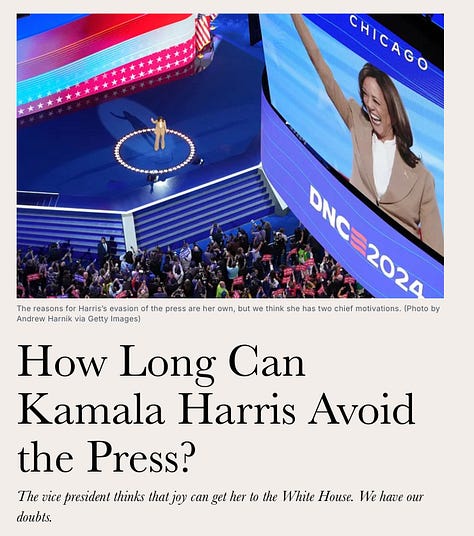
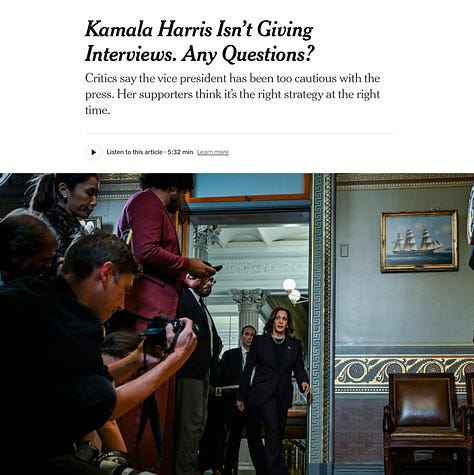


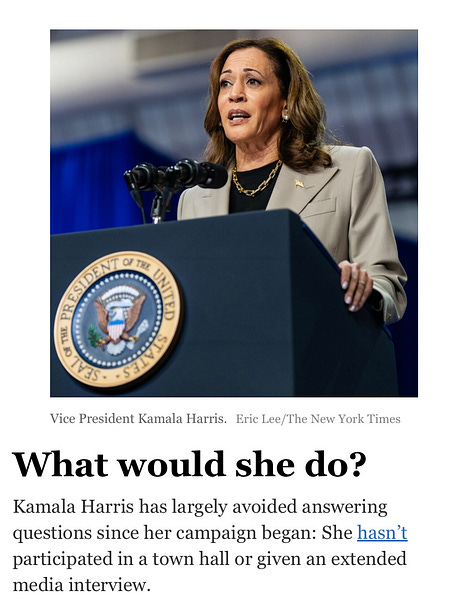

The “elephant” in my arena, threatening to stomp on my joy, is the mainstream press itself.
I’ve been writing about media malpractice, in two books and more articles than I can bear to think about, since the 2015 primaries. People may not remember just how popular Hillary Clinton was after her stints as senator from New York and Obama’s Secretary of State. By 2014, a year before Hillary announced her intention to run for president, a New York Times/CBS News poll found that 82 percent of Democrats favored Clinton over both Joe Biden and Elizabeth Warren, and a Quinnipiac poll reported that registered voters in Ohio (yes—Ohio) chose Clinton over the six likely Republican candidates: Jeb Bush, Marco Rubio, Rand Paul, Ted Cruz, and John Kasich. “If the election were held tomorrow,” John McCain said, “Hillary Clinton would most likely be the president.”
Then, In April of 2015, Hillary announced her candidacy, and within weeks, John McCain’s prediction was replaced by the press with her annoying “presumption of inevitability.” They complained she was being “coronated” and gave her primary opponent, Bernie Sanders, tons of positive press for supplying them with a competition whose progress they could excitedly report on, and—bonus!—it began to seem like a “movement”! Trump, who called in to schmooze with Mika and Joe on “Morning Joe” several times a week, was seen as refreshingly “authentic” while Hillary was so…evasive. And viewers/readers, taking their cue from the coverage, consistently rated Trump as “more honest” than Hillary.
And then, of course, there were the “email scandals.” Even Andrea Mitchell admits that the press harassed Hillary over her use of a private server. What I detail in my book—and what the press has not yet admitted—is not just the extreme damage done by that harassment and the “investigation” it generated but the fact that The New York Times, via Michael Schmidt, essentially created the “scandal”:
The media’s harassment of Hillary was relentless—and if you think this is an exaggeration, take a look at the June 2016 report from Harvard’s Shorenstein Center which showed that even when “scandals” were not involved, 84 percent of Clinton’s coverage was negative compared to 43 percent of Trump’s and 17 percent of Sanders’s. The report notes: “Clinton’s negative coverage can be equated to millions of dollars in attack ads, with her on the receiving end.”
It’s no wonder that Hillary, as she describes it, learned to “think before I speak” and “sometimes sound careful with my words. [It’s] not that I’m hiding something, it’s just that I’m careful with my words.” The irony is that this caution engendered an abiding, low-level hostility toward her from the media. We saw this frequently during the election cycle—in complaints about her lack of press conferences, the constant descriptions of her “secretive” and “calculating” responses to the press, and the snide side comments about her “carefully choreographed appearances” and “halting” answers. The construction of this cagey Hillary Clinton was so ubiquitous, so embedded in virtually every story about her, that it made no difference whether you were watching Fox News or MSNBC—untrustworthy, evasive Hillary was all you were going to get.
When Hillary did do interviews and press conferences, the reporters’ voracious hunger to catch her in a blunder, a quotable “gaffe,” or a potential “gotcha” over-rode any concern for the truth. And they just wouldn’t let go of those emails. (For an illustration, here’s a transcript of a typical news conference:1)
Commentators, now speculating about 2024, like to reflect on Trump’s appeal. But they rarely think back to 2016, before MAGA became the cult that it is today and the GOP had not yet entirely lost its mind. They don’t seem to recognize (or don’t want to recognize) that Trump wasn’t so much elected in 2016 as Hillary was defeated (and even then only because of the insanity of the electoral college)—and they played a huge role in that.
Yes, I know: Russia, Comey, Benghazi, the Right-Wing Hillary-hate machine, etc. But none of that would have become so bubbling hot among ordinary voters were it not the mainstream media, who served as a conveyor-belt and mass disseminator of everything that got thrown onto the radar screen, no matter how ill-founded. Giving “bad optics” the prominence of established fact, lazily fitting every news story into the narrative of “untrustworthy Hillary,” paying more attention to the content of every leaked email than the much more significant story of the Russian origin of the leaks, continually declaring “momentum” for Sanders and Trump and “lack of enthusiasm” for Hillary (who did, after all, overwhelmingly win the popular vote,) and giving enormous free air-time to Trump’s rallies rather than Clinton’s policy speeches (which we now realize were prophetic)—these are some of the ways in which the mainstream media, both networks and cable news, helped make Trump happen:
Hillary and Kamala are different people (duh) and our lives are vastly different from what they were in 2015. I’m not suggesting that I’m worried about a duplication of what happened to Hillary. But it remains the case that the over-riding interest of the press—from top to bottom, from owners to junior reporters—is The Story. Sometimes those stories prove important, sometimes they unearth facts, offer analyses, asks questions whose answers are needed. But as the coverage of 2015-2016 showed, they can also create destructive momentum for trivial, unfounded, and hugely consequential narratives. And when that happens, the press is reluctant to “correct the record.” So we have to be watchful, skeptical consumers of the stories they sell us.
For a while the joyful new “vibes” of the Harris/Walz campaign were a huge story. But as that’s became ho hum, new “stories” have been seized on, and there will be plenty more to come. This week, after numerous demands for Harris to oblige the media (see video below, and please excuse bird tweets, tv noise background and “Go Away!” to doggy about to jump on my lap), CNN is the lucky winner of her first “sit down” interview, and all day long today and tomorrow we’ll undoubtedly be hearing how “the pressure” will be on her in this “crucial” event.
Watch it with me tomorrow night and let’s talk about it!
QUESTION: I was wondering if you think that you made a mistake either in exclusively using your private e-mail or in response to the controversy around it. And, if so, what have you learned from that?
CLINTON: Well, I have to tell you that, as I said in my remarks, looking back, it would have been probably, you know, smarter to have used two devices. But I have absolute confidence that everything that could be in any way connected to work is now in the possession of the State Department.
And I have to add, even if I had had two devices, which is obviously permitted — many people do that — you would still have to put the responsibility where it belongs, which is on the official. So I did it for convenience and I now, looking back, think that it might have been smarter to have those two devices from the very beginning.
QUESTION: Secretary Clinton?
CLINTON: Yes? QUESTION: Did you or any of your aides delete any government- related e-mails from your personal account? And what lengths are you willing to go to to prove that you didn’t?
Some people, including supporters of yours, have suggested having an independent arbiter look at your server, for instance.
CLINTON: We did not. In fact, my direction to conduct the thorough investigation was to err on the side of providing anything that could be possibly viewed as work related.
That doesn’t mean they will be by the State Department once the State Department goes through them, but out of an abundance of caution and care, you know, we wanted to send that message unequivocally.
That is the responsibility of the individual and I have fulfilled that responsibility, and I have no doubt that we have done exactly what we should have done. When the search was conducted, we were asking that any email be identified and preserved that could potentially be federal records, and that’s exactly what we did.
And we went, as I said, beyond that. And the process produced over 30,000 you know, work emails, and I think that we have more than met the requests from the State Department. The server contains personal communications from my husband and me, and I believe I have met all of my responsibilities and the server will remain private and I think that the State Department will be able, over time, to release all of the records that were provided.
QUESTION: Madam Secretary, can you…
CLINTON: Right there.
QUESTION: Madam Secretary, two quick follow ups. You mentioned the server. That’s one of the distinctions here.
This wasn’t Gmail or Yahoo or something. This was a server that you owned. Is that appropriate? Is it — was there any precedent for it? Did you clear it with any State Department security officials? And do they have — did they have full access to it when you were secretary?
And then separately, will any of this have any bearing or effect on your timing or decision about whether or not you run for president? Thank you.
CLINTON: Well, the system we used was set up for President Clinton’s office. And it had numerous safeguards. It was on property guarded by the Secret Service. And there were no security breaches.
So, I think that the — the use of that server, which started with my husband, certainly proved to be effective and secure. Now, with respect to any sort of future — future issues, look, I trust the American people to make their decisions about political and public matters. And I feel that I’ve taken unprecedented steps to provide these work-related emails. They’re going to be in the public domain. And I think that Americans will find that you know, interesting, and I look forward to having a discussion about that.
QUESTION: Madam Secretary?
CLINTON: Hi.
QUESTION: How could the public be assured that when you deleted emails that were personal in nature, that you didn’t also delete emails that were professional, but possibly unflattering?
And what do you think about this Republican idea of having an independent third party come in an examine your emails?
CLINTON: Well first of all, you have to ask that question to every single federal employee, because the way the system works, the federal employee, the individual, whether they have one device, two devices, three devices, how many addresses, they make the decision.
So, even if you have a work-related device with a work-related .gov account, you choose what goes on that. That is the way our system works. And so we trust and count on the judgment of thousands, maybe millions of people to make those decisions.
And I feel that I did that and even more, that I went above and beyond what I was requested to do. And again, those will be out in the public domain, and people will be able to judge for themselves.
QUESTION: Okay, Madam.
Madam Secretary?
Madam Secretary, excuse me.
Madam Secretary, State Department rules at the time you were secretary were perfectly clear that if a State Department employee was going to be using private email, that employee needed to turn those emails over to the State Department to be preserved on government computers.
Why did you not do that? Why did you not go along with State Department rules until nearly two years after you left office?
QUESTION: And also, the president of the United States said that he was unaware that you had this unusual email arrangement. The White House counsel’s office says that you never approved this arrangement through them.
Why did you not do that? Why did you — why have you apparently caught the White House by surprise?
And then just one last political question, if I — I might. Does all of this make — affect your decision in any way on whether or not to run for president?
CLINTON: Well, let me try to unpack your multiple questions.
First, the laws and regulations in effect when I was secretary of state allowed me to use my email for work. That is undisputed.
Secondly, under the Federal Records Act, records are defined as reported information, regardless of its form or characteristics, and in meeting the record keeping obligations, it was my practice to email government officials on their state or other .gov accounts so that the emails were immediately captured and preserved.
Now, there are different rules governing the White House than there are governing the rest of the executive branch, and in order to address the requirements I was under, I did exactly what I have said. I emailed two people, and I not only knew, I expected that then to be captured in the State Department or any other government agency that I was emailing to at a .gov account.
What happened in — sorry, I guess late summer, early — early fall, is that the State Department sent a letter to former secretaries of state, not just to me, asking for some assistance in providing any work-related emails that might be on the personal email.
And what I did was to direct, you know, my counsel to conduct a thorough investigation and to err on the side of providing anything that could be connected to work. They did that, and that was my obligation. I fully fulfilled it, and then I took the unprecedented step of saying, “Go ahead and release them, and let people see them.”
QUESTION: Why did you wait two months? Why — why did you wait two months to turn those emails over? The rules say you have to turn them over…
(CROSSTALK) CLINTON: I don’t think — I’d be happy to have somebody talk to you about the rules. I fully complied with every rule that I was governed by.
QUESTION: Were you ever — were you ever specifically briefed on the security implications of using — using your own email server and using your personal address to email with the president?
CLINTON: I did not email any classified material to anyone on my email. There is no classified material.
So I’m certainly well-aware of the classification requirements and did not send classified material.)
QUESTION: (OFF-MIKE)
CLINTON: Because they were personal and private about matters that I believed were within the scope of my personal privacy and that particularly of other people. They have nothing to do with work, but I didn’t see any reason to keep them.




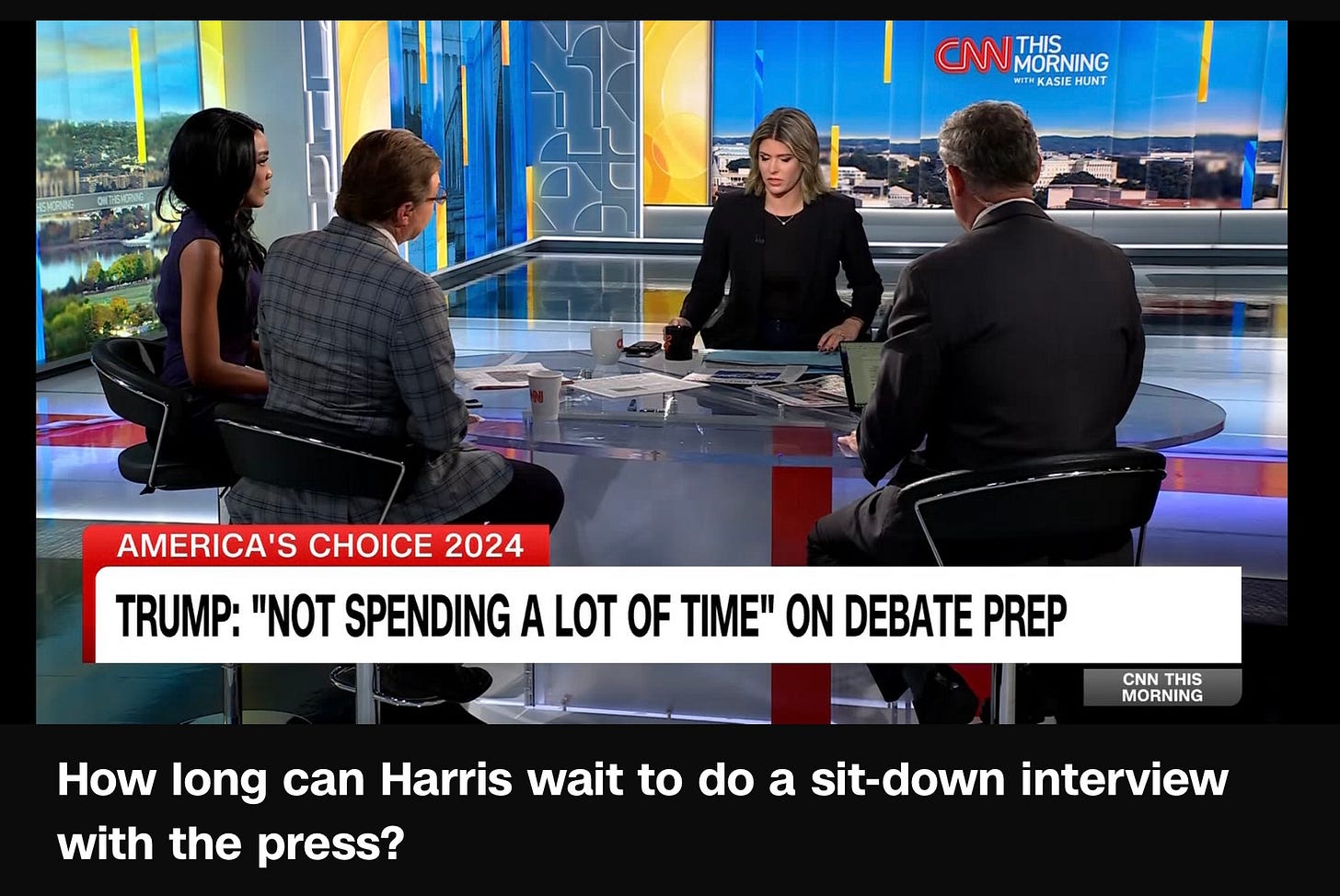


I'm concerned about Harris not taking questions. She should take them every day, like Trump. We like to make fun of Trump, but that's how he won in '16.
Susan, you are preaching to the converted with me. The NYT definitely turned the Hillary email fracas into The Story, and ever since, the paper of record (or current news organization monopoly) has tumbled in my estimation. Lately, I’ve been thinking about why so many commentators think “joy” is not enough - now Kamala has to get “serious” - it would be laughable, if the stakes weren’t so high.
That said, Kamala should be talking every day to the public, and not just asking for money. She could be on all sorts of podcasts, video channels, and social media rather than traditional press interviews. She and her staff should keep putting out Instagram stories and the like. Frankly, I think she should manage her persona and narrative like female celebrities do, because the traditional press approach is broken for woman politicians.